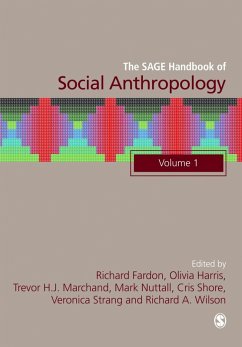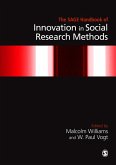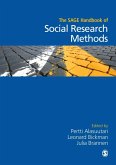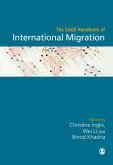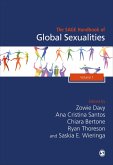The SAGE Handbook of Social Anthropology (eBook, PDF)
Redaktion: Fardon, Richard; Nuttall, Mark; Wilson, Richard A; Strang, Veronica; Shore, Cris; Marchand, Trevor H J; Harris, Oliva
254,95 €
254,95 €
inkl. MwSt.
Sofort per Download lieferbar

127 °P sammeln
254,95 €
Als Download kaufen

254,95 €
inkl. MwSt.
Sofort per Download lieferbar

127 °P sammeln
Jetzt verschenken
Alle Infos zum eBook verschenken
254,95 €
inkl. MwSt.
Sofort per Download lieferbar
Alle Infos zum eBook verschenken

127 °P sammeln
The SAGE Handbook of Social Anthropology (eBook, PDF)
Redaktion: Fardon, Richard; Nuttall, Mark; Wilson, Richard A; Strang, Veronica; Shore, Cris; Marchand, Trevor H J; Harris, Oliva
- Format: PDF
- Merkliste
- Auf die Merkliste
- Bewerten Bewerten
- Teilen
- Produkt teilen
- Produkterinnerung
- Produkterinnerung

Bitte loggen Sie sich zunächst in Ihr Kundenkonto ein oder registrieren Sie sich bei
bücher.de, um das eBook-Abo tolino select nutzen zu können.
Hier können Sie sich einloggen
Hier können Sie sich einloggen
Sie sind bereits eingeloggt. Klicken Sie auf 2. tolino select Abo, um fortzufahren.

Bitte loggen Sie sich zunächst in Ihr Kundenkonto ein oder registrieren Sie sich bei bücher.de, um das eBook-Abo tolino select nutzen zu können.
In two volumes, the SAGE Handbook of Social Anthropology provides the definitive overview of contemporary research in the discipline. It explains the what, where, and how of current and anticipated work in Social Anthropology. With 80 authors, contributing more than 60 chapters, this is the most comprehensive and up-to-date statement of research in Social Anthropology available and the essential point of departure for future projects.
The Handbook is divided into four sections:
-Part I: Interfaces examines Social Anthropology's disciplinary connections, from Art and Literature to…mehr
- Geräte: PC
- mit Kopierschutz
- eBook Hilfe
- Größe: 14.15MB
Andere Kunden interessierten sich auch für
![The SAGE Handbook of Innovation in Social Research Methods (eBook, PDF) The SAGE Handbook of Innovation in Social Research Methods (eBook, PDF)]() The SAGE Handbook of Innovation in Social Research Methods (eBook, PDF)31,95 €
The SAGE Handbook of Innovation in Social Research Methods (eBook, PDF)31,95 €![The SAGE Handbook of Criminological Research Methods (eBook, PDF) The SAGE Handbook of Criminological Research Methods (eBook, PDF)]() The SAGE Handbook of Criminological Research Methods (eBook, PDF)100,95 €
The SAGE Handbook of Criminological Research Methods (eBook, PDF)100,95 €![The SAGE Handbook of Social Research Methods (eBook, PDF) The SAGE Handbook of Social Research Methods (eBook, PDF)]() The SAGE Handbook of Social Research Methods (eBook, PDF)35,95 €
The SAGE Handbook of Social Research Methods (eBook, PDF)35,95 €![The SAGE Handbook of International Migration (eBook, PDF) The SAGE Handbook of International Migration (eBook, PDF)]() The SAGE Handbook of International Migration (eBook, PDF)100,95 €
The SAGE Handbook of International Migration (eBook, PDF)100,95 €![The SAGE Handbook of Global Sexualities (eBook, PDF) The SAGE Handbook of Global Sexualities (eBook, PDF)]() The SAGE Handbook of Global Sexualities (eBook, PDF)226,95 €
The SAGE Handbook of Global Sexualities (eBook, PDF)226,95 €![The SAGE Handbook of Cultural Sociology (eBook, PDF) The SAGE Handbook of Cultural Sociology (eBook, PDF)]() The SAGE Handbook of Cultural Sociology (eBook, PDF)100,95 €
The SAGE Handbook of Cultural Sociology (eBook, PDF)100,95 €![The SAGE Handbook of Sociolinguistics (eBook, PDF) The SAGE Handbook of Sociolinguistics (eBook, PDF)]() The SAGE Handbook of Sociolinguistics (eBook, PDF)31,95 €
The SAGE Handbook of Sociolinguistics (eBook, PDF)31,95 €-
-
-
In two volumes, the SAGE Handbook of Social Anthropology provides the definitive overview of contemporary research in the discipline. It explains the what, where, and how of current and anticipated work in Social Anthropology. With 80 authors, contributing more than 60 chapters, this is the most comprehensive and up-to-date statement of research in Social Anthropology available and the essential point of departure for future projects.
The Handbook is divided into four sections:
-Part I: Interfaces examines Social Anthropology's disciplinary connections, from Art and Literature to Politics and Economics, from Linguistics to Biomedicine, from History to Media Studies.
-Part II: Places examines place, region, culture, and history, from regional, area studies to a globalized world
-Part III: Methods examines issues of method; from archives to war zones, from development projects to art objects, and from ethics to comparison
-Part IV: Futures anticipates anthropologies to come: in the Brain Sciences; in post-Development; in the Body and Health; and in new Technologies and Materialities
Edited by the leading figures in social anthropology, the Handbook includes a substantive introduction by Richard Fardon, a think piece by Jean and John Comaroff, and a concluding last word on futures by Marilyn Strathern. The authors - each at the leading edge of the discipline - contribute in-depth chapters on both the foundational ideas and the latest research.
Comprehensive and detailed, this magisterial Handbook overviews the last 25 years of the social anthropological imagination. It will speak to scholars in Social Anthropology and its many related disciplines.
The Handbook is divided into four sections:
-Part I: Interfaces examines Social Anthropology's disciplinary connections, from Art and Literature to Politics and Economics, from Linguistics to Biomedicine, from History to Media Studies.
-Part II: Places examines place, region, culture, and history, from regional, area studies to a globalized world
-Part III: Methods examines issues of method; from archives to war zones, from development projects to art objects, and from ethics to comparison
-Part IV: Futures anticipates anthropologies to come: in the Brain Sciences; in post-Development; in the Body and Health; and in new Technologies and Materialities
Edited by the leading figures in social anthropology, the Handbook includes a substantive introduction by Richard Fardon, a think piece by Jean and John Comaroff, and a concluding last word on futures by Marilyn Strathern. The authors - each at the leading edge of the discipline - contribute in-depth chapters on both the foundational ideas and the latest research.
Comprehensive and detailed, this magisterial Handbook overviews the last 25 years of the social anthropological imagination. It will speak to scholars in Social Anthropology and its many related disciplines.
Dieser Download kann aus rechtlichen Gründen nur mit Rechnungsadresse in A, D ausgeliefert werden.
Produktdetails
- Produktdetails
- Verlag: SAGE Publications
- Seitenzahl: 1184
- Erscheinungstermin: 31. Oktober 2013
- Englisch
- ISBN-13: 9781446266014
- Artikelnr.: 41836059
- Verlag: SAGE Publications
- Seitenzahl: 1184
- Erscheinungstermin: 31. Oktober 2013
- Englisch
- ISBN-13: 9781446266014
- Artikelnr.: 41836059
- Herstellerkennzeichnung Die Herstellerinformationen sind derzeit nicht verfügbar.
Richard Fardon, Professor of West African Anthropology at SOAS, University of London, was Chair of the Association of Social Anthropologists (2001-5). His recent books have been about art and ritual in Cameroon and Nigeria, where he has researched - via fieldwork, archives and museum/art collections - since the mid-1970s: Column to Volume (2005, with Christine Stelzig), Lela in Bali (2006), Fusions (2007), Central Nigeria Unmasked (2011, with Marla Berns and Sidney Kasfir). John Gledhill, Max Gluckman Professor of Social Anthropology at the University of Manchester, was Chair of the Association of Social Anthropologists (2005-9. His extensive fieldwork in Mexico and Brazil is currently focused on security issues. Publications include Casi Nada: Agrarian Reform in the Homeland of Cardenismo (1991); Neoliberalism, Transnationalization and Rural Poverty; Power and Its Disguises (1995): Anthropological Perspectives on Politics (2000); and Cultura y Desafío en Ostula: Cuatro Siglos de Autonomía Indígena en la Costa-Sierra Nahua de Michoacán (2004). Olivia Harris was Professor of Anthropology at the London School of Economics, where she moved from Goldsmiths, University of London. Following fieldwork in Bolivia, she wrote on gender, the family, exchange, labour and temporalities. She published To Make the Earth Bear Fruit (London 2000) and many articles. With Tristan Platt and Thérèse Bouysse-Cassagne she co-authored Qaraqara-Charka. Mallku, Inka y Rey en la Provincia de Charcas (2006). Future research would have included the Bolivian Revolution of 1952. Trevor H.J. Marchand is Professor of Social Anthropology at SOAS, University of London. Previously a practising architect, he has undertaken fieldwork with masons in South Arabia and West Africa, and most recently with woodworkers and furniture makers in London. He is the author of Minaret Building & Apprenticeship in Yemen (2001), The Masons of Djenné (2009) and The Pursuit of Pleasurable Work (forthcoming), and co-producer of the documentary film Future of Mud. He was Publications Officer of the Association of Social Anthropologists (2004-2008). Mark Nuttall is Professor and Henry Marshall Tory Chair in the Department of Anthropology at the University of Alberta, Canada. He has carried out extensive fieldwork and research in Greenland, Canada, Alaska, Scotland and Finland. He is editor of the Encyclopedia of the Arctic (2005), co-editor of Anthropology and Climate Change: from Encounters to Actions (2009), and author of Pipeline Dreams: People, Environment, and the Arctic Energy Frontier (2010). Cris Shore is Professor of Social Anthropology at the University of Auckland where until recently he was also Head of Department and Director of the Europe Institute. His research expertise lies in the fields of political anthropology and the ethnography of organizations, particularly the anthropology of Europe and the European Union. He has carried out long-term fieldwork in Italy, the UK and New Zealand. His current project is a study of university reform, neoliberalism, and globalization. Veronica Strang is a Professor of Anthropology at the University of Auckland. Specializing in human-environmental relations, she has written extensively on water, land and resource issues in Australia and the UK. Her publications include The Meaning of Water (2004); Gardening the World: Agency, Identity, and the Ownership of Water (2009); and the ASA Monograph Ownership and Appropriation (2010, edited with Mark Busse). Richard A. Wilson is Gladstein Chair of Human Rights, Professor of Anthropology and Law, and Director of the University of Connecticut′s Human Rights Institute, which he founded in 2003. He taught previously at the universities of Essex and Sussex in the UK. His work focuses on international human rights, truth commissions and international criminal tribunals. Writing History in International Criminal Trials (2011) was completed during a Fellowship from the National Endowment for the Humanities. He is current Chair of the Connecticut State Advisory Committee of the US Commission on Civil Rights.
VOLUME ONE
Preface: The Association of Social Anthropologists of the UK and the
Commonwealth - John Gledhill and James Fairhead
Foreword: Thinking Anthropologically, About British Social Anthropology -
John L. Comaroff and Jean Comaroff
Introduction: Flying Theory, Grounded Method - Richard Fardon
PART ONE: INTERFACES - Edited by Cris Shore and Richard A. Wilson
Introduction: Anthropology¿s Interdisciplinary Connections - Cris Shore and
Richard A. Wilson
Anthropology and Linguistics - Alessandro Duranti
Anthropology and Psychology - Christina Toren
Anthropology of Biomedicine and Bioscience - Sarah Franklin
Anthropology and Art - Arnd Schneider
Anthropology, Media and Cultural Studies - Kevin Latham
Anthropology and Public Policy - Cris Shore
Anthropology and Law - Sally Engle Merry
Anthropology and History - Jane K. Cowan
Anthropology and Archaeology - Julian Thomas
Anthropology, Economics and Development Studies - Keith Hart
Anthropology and the Political - Jennifer Curtis and Jonathan Spencer
Anthropology and Religious Studies - Martin Mills
Anthropology and Museums - Brian Durrans
Anthropology and Gender Studies - Henrietta L. Moore
Anthropology and the Postcolonial - Richard Werbner
Anthropology and Literature - C.W. Watson
PART TWO: PLACES - Edited by Mark Nuttall
Introduction: Place, Region, Culture, History: From Area Studies to a
Globalized World - Mark Nuttall
The Circumpolar North: Locating the Arctic and Sub-Arctic - Mark Nuttall
Replacing Europe - Sarah Green
Retroversion, Introversion, Extraversion: Three Aspects of African
Anthropology - David Pratten
Refiguring the Anthropology of the Middle East and North Africa - Glenn
Bowman
Southwest and Central Asia: Comparison, Integration or Beyond? - Magnus
Marsden
South Asia: Intimacy and Identities, Politics and Poverty - Patricia
Jeffery and Roger Jeffery
Modernization and its Aftermath: The Anthropology of Japan - D.P. Martinez
The Emerging Socio-Cultural Anthropology of Emerging China - J.S. Eades
Archipelagic Southeast Asia - Roy Ellen
Australasian Contrasts - Nicolas Peterson, Don Gardner and James Urry
Australia - Nicolas Peterson
Melanesia - Don Gardner
New Zealand/Aotearoa - James Urry
Two Indigenous Americas - Kathleen Lowrey and Pauline Turner Strong
North America - Pauline Turner Strong
South America - Kathleen Lowrey
North and Latin American National Societies from a Continental Perspective
- John Gledhill and Peter Wade
Migration and Other Forms of Movement - Vered Amit
The Cosmopolitan World - Nigel Rapport
The Indigenous World - Robert K. Hitchcock and Maria Sapignoli
VOLUME TWO
PART THREE: METHODS - Edited by the late Olivia Harris and Veronica Strang
Introduction: Issues of Method - Richard Fardon and Veronica Strang
Fieldwork Since the 1980s: Total Immersion and its Discontents - Janet
Carsten
Between Routine and Rupture: The Archive as Field Event - Tristan Platt
The Role of Language in Ethnographic Method - Susan Gal
The Ethnographic Interview in an Age of Globalization - Joshua Barker
Interpreting Texts and Performances - Karin Barber
Blurred Visions: Reflecting Visual Anthropology - Rupert Cox and
Christopher Wright
Artefacts in Anthropology - Liana Chua and Amiria Salmond
Knowledge and Experimental Practice: A Dialogue Between Anthropology and
Science and Technology Studies - Penelope Harvey
Twenty-first Century Ethics for Audited Anthropologists - Nayanika
Mookherjee
Ethics Out of the Ordinary - Michael Lambek
Researching Zones of Conflict and War - Paul Richards
Conflicts and Compromises? Experiences of Doing Anthropology at the
Interface of Public Policy - Tim Allen and Melissa Parker
From Participant-Observation to Participant-Collaboration: Some
Observations on Participatory-cum-Collaborative Approaches - Paul Sillitoe
Comparative Methods in Socio-Cultural Anthropology Today - Andre Gingrich
PART FOUR: FUTURES - Edited by Trevor H.J. Marchand
Introduction: Anthropologies to Come - Trevor H.J. Marchand
Section 4.1: Neo-Darwinism, Biology and the Brain Sciences
Anthropology and Neo-Darwinism - Robin I.M. Dunbar
Cognition, Evolution and the Future of Social Anthropology - Harvey
Whitehouse
Neuroanthropology - Greg Downey
Knowledge in Hand: Explorations of Brain, Hand and Tool - Trevor H.J.
Marchand
Section 4.2: After Development: Environment, Food, Energy, Disaster
Environment and Society: Political Ecologies and Moral Futures - James
Fairhead and Melissa Leach
Anthropological Encounters with Economic Development and Biodiversity
Conservation - Laura M. Rival
New Directions in the Anthropology of Food - Jakob A. Klein, Johan Pottier
and Harry G. West
Water, Land and Territory - Veronica Strang
The Anthropology of Disaster Aftermath - Edward Simpson
Section 4.3: Demographics, Health and the Transforming Body
Demographies in Flux - Sophie Day
New Medical Anthropology - Helen Lambert
The Anthropology of Drugs - Axel Klein
Transforming Bodies: The Embodiment of Sexual and Gender Difference -
Andrea Cornwall
Section 4.4: New Technologies and Materialities
New Materials and New Technologies: Science, Design and the Challenge to
Anthropology - Susanne K chler
Anthropology and Emerging Technologies: Science, Subject and Symbiosis -
Ron Eglash
From Media Anthropology to the Anthropology of Mediation - Dominic Boyer
Anthropology in the New Millennium - Christopher Pinney
Afterword: A Last Word on Futures - Marilyn Strathern
Preface: The Association of Social Anthropologists of the UK and the
Commonwealth - John Gledhill and James Fairhead
Foreword: Thinking Anthropologically, About British Social Anthropology -
John L. Comaroff and Jean Comaroff
Introduction: Flying Theory, Grounded Method - Richard Fardon
PART ONE: INTERFACES - Edited by Cris Shore and Richard A. Wilson
Introduction: Anthropology¿s Interdisciplinary Connections - Cris Shore and
Richard A. Wilson
Anthropology and Linguistics - Alessandro Duranti
Anthropology and Psychology - Christina Toren
Anthropology of Biomedicine and Bioscience - Sarah Franklin
Anthropology and Art - Arnd Schneider
Anthropology, Media and Cultural Studies - Kevin Latham
Anthropology and Public Policy - Cris Shore
Anthropology and Law - Sally Engle Merry
Anthropology and History - Jane K. Cowan
Anthropology and Archaeology - Julian Thomas
Anthropology, Economics and Development Studies - Keith Hart
Anthropology and the Political - Jennifer Curtis and Jonathan Spencer
Anthropology and Religious Studies - Martin Mills
Anthropology and Museums - Brian Durrans
Anthropology and Gender Studies - Henrietta L. Moore
Anthropology and the Postcolonial - Richard Werbner
Anthropology and Literature - C.W. Watson
PART TWO: PLACES - Edited by Mark Nuttall
Introduction: Place, Region, Culture, History: From Area Studies to a
Globalized World - Mark Nuttall
The Circumpolar North: Locating the Arctic and Sub-Arctic - Mark Nuttall
Replacing Europe - Sarah Green
Retroversion, Introversion, Extraversion: Three Aspects of African
Anthropology - David Pratten
Refiguring the Anthropology of the Middle East and North Africa - Glenn
Bowman
Southwest and Central Asia: Comparison, Integration or Beyond? - Magnus
Marsden
South Asia: Intimacy and Identities, Politics and Poverty - Patricia
Jeffery and Roger Jeffery
Modernization and its Aftermath: The Anthropology of Japan - D.P. Martinez
The Emerging Socio-Cultural Anthropology of Emerging China - J.S. Eades
Archipelagic Southeast Asia - Roy Ellen
Australasian Contrasts - Nicolas Peterson, Don Gardner and James Urry
Australia - Nicolas Peterson
Melanesia - Don Gardner
New Zealand/Aotearoa - James Urry
Two Indigenous Americas - Kathleen Lowrey and Pauline Turner Strong
North America - Pauline Turner Strong
South America - Kathleen Lowrey
North and Latin American National Societies from a Continental Perspective
- John Gledhill and Peter Wade
Migration and Other Forms of Movement - Vered Amit
The Cosmopolitan World - Nigel Rapport
The Indigenous World - Robert K. Hitchcock and Maria Sapignoli
VOLUME TWO
PART THREE: METHODS - Edited by the late Olivia Harris and Veronica Strang
Introduction: Issues of Method - Richard Fardon and Veronica Strang
Fieldwork Since the 1980s: Total Immersion and its Discontents - Janet
Carsten
Between Routine and Rupture: The Archive as Field Event - Tristan Platt
The Role of Language in Ethnographic Method - Susan Gal
The Ethnographic Interview in an Age of Globalization - Joshua Barker
Interpreting Texts and Performances - Karin Barber
Blurred Visions: Reflecting Visual Anthropology - Rupert Cox and
Christopher Wright
Artefacts in Anthropology - Liana Chua and Amiria Salmond
Knowledge and Experimental Practice: A Dialogue Between Anthropology and
Science and Technology Studies - Penelope Harvey
Twenty-first Century Ethics for Audited Anthropologists - Nayanika
Mookherjee
Ethics Out of the Ordinary - Michael Lambek
Researching Zones of Conflict and War - Paul Richards
Conflicts and Compromises? Experiences of Doing Anthropology at the
Interface of Public Policy - Tim Allen and Melissa Parker
From Participant-Observation to Participant-Collaboration: Some
Observations on Participatory-cum-Collaborative Approaches - Paul Sillitoe
Comparative Methods in Socio-Cultural Anthropology Today - Andre Gingrich
PART FOUR: FUTURES - Edited by Trevor H.J. Marchand
Introduction: Anthropologies to Come - Trevor H.J. Marchand
Section 4.1: Neo-Darwinism, Biology and the Brain Sciences
Anthropology and Neo-Darwinism - Robin I.M. Dunbar
Cognition, Evolution and the Future of Social Anthropology - Harvey
Whitehouse
Neuroanthropology - Greg Downey
Knowledge in Hand: Explorations of Brain, Hand and Tool - Trevor H.J.
Marchand
Section 4.2: After Development: Environment, Food, Energy, Disaster
Environment and Society: Political Ecologies and Moral Futures - James
Fairhead and Melissa Leach
Anthropological Encounters with Economic Development and Biodiversity
Conservation - Laura M. Rival
New Directions in the Anthropology of Food - Jakob A. Klein, Johan Pottier
and Harry G. West
Water, Land and Territory - Veronica Strang
The Anthropology of Disaster Aftermath - Edward Simpson
Section 4.3: Demographics, Health and the Transforming Body
Demographies in Flux - Sophie Day
New Medical Anthropology - Helen Lambert
The Anthropology of Drugs - Axel Klein
Transforming Bodies: The Embodiment of Sexual and Gender Difference -
Andrea Cornwall
Section 4.4: New Technologies and Materialities
New Materials and New Technologies: Science, Design and the Challenge to
Anthropology - Susanne K chler
Anthropology and Emerging Technologies: Science, Subject and Symbiosis -
Ron Eglash
From Media Anthropology to the Anthropology of Mediation - Dominic Boyer
Anthropology in the New Millennium - Christopher Pinney
Afterword: A Last Word on Futures - Marilyn Strathern
VOLUME ONE
Preface: The Association of Social Anthropologists of the UK and the
Commonwealth - John Gledhill and James Fairhead
Foreword: Thinking Anthropologically, About British Social Anthropology -
John L. Comaroff and Jean Comaroff
Introduction: Flying Theory, Grounded Method - Richard Fardon
PART ONE: INTERFACES - Edited by Cris Shore and Richard A. Wilson
Introduction: Anthropology¿s Interdisciplinary Connections - Cris Shore and
Richard A. Wilson
Anthropology and Linguistics - Alessandro Duranti
Anthropology and Psychology - Christina Toren
Anthropology of Biomedicine and Bioscience - Sarah Franklin
Anthropology and Art - Arnd Schneider
Anthropology, Media and Cultural Studies - Kevin Latham
Anthropology and Public Policy - Cris Shore
Anthropology and Law - Sally Engle Merry
Anthropology and History - Jane K. Cowan
Anthropology and Archaeology - Julian Thomas
Anthropology, Economics and Development Studies - Keith Hart
Anthropology and the Political - Jennifer Curtis and Jonathan Spencer
Anthropology and Religious Studies - Martin Mills
Anthropology and Museums - Brian Durrans
Anthropology and Gender Studies - Henrietta L. Moore
Anthropology and the Postcolonial - Richard Werbner
Anthropology and Literature - C.W. Watson
PART TWO: PLACES - Edited by Mark Nuttall
Introduction: Place, Region, Culture, History: From Area Studies to a
Globalized World - Mark Nuttall
The Circumpolar North: Locating the Arctic and Sub-Arctic - Mark Nuttall
Replacing Europe - Sarah Green
Retroversion, Introversion, Extraversion: Three Aspects of African
Anthropology - David Pratten
Refiguring the Anthropology of the Middle East and North Africa - Glenn
Bowman
Southwest and Central Asia: Comparison, Integration or Beyond? - Magnus
Marsden
South Asia: Intimacy and Identities, Politics and Poverty - Patricia
Jeffery and Roger Jeffery
Modernization and its Aftermath: The Anthropology of Japan - D.P. Martinez
The Emerging Socio-Cultural Anthropology of Emerging China - J.S. Eades
Archipelagic Southeast Asia - Roy Ellen
Australasian Contrasts - Nicolas Peterson, Don Gardner and James Urry
Australia - Nicolas Peterson
Melanesia - Don Gardner
New Zealand/Aotearoa - James Urry
Two Indigenous Americas - Kathleen Lowrey and Pauline Turner Strong
North America - Pauline Turner Strong
South America - Kathleen Lowrey
North and Latin American National Societies from a Continental Perspective
- John Gledhill and Peter Wade
Migration and Other Forms of Movement - Vered Amit
The Cosmopolitan World - Nigel Rapport
The Indigenous World - Robert K. Hitchcock and Maria Sapignoli
VOLUME TWO
PART THREE: METHODS - Edited by the late Olivia Harris and Veronica Strang
Introduction: Issues of Method - Richard Fardon and Veronica Strang
Fieldwork Since the 1980s: Total Immersion and its Discontents - Janet
Carsten
Between Routine and Rupture: The Archive as Field Event - Tristan Platt
The Role of Language in Ethnographic Method - Susan Gal
The Ethnographic Interview in an Age of Globalization - Joshua Barker
Interpreting Texts and Performances - Karin Barber
Blurred Visions: Reflecting Visual Anthropology - Rupert Cox and
Christopher Wright
Artefacts in Anthropology - Liana Chua and Amiria Salmond
Knowledge and Experimental Practice: A Dialogue Between Anthropology and
Science and Technology Studies - Penelope Harvey
Twenty-first Century Ethics for Audited Anthropologists - Nayanika
Mookherjee
Ethics Out of the Ordinary - Michael Lambek
Researching Zones of Conflict and War - Paul Richards
Conflicts and Compromises? Experiences of Doing Anthropology at the
Interface of Public Policy - Tim Allen and Melissa Parker
From Participant-Observation to Participant-Collaboration: Some
Observations on Participatory-cum-Collaborative Approaches - Paul Sillitoe
Comparative Methods in Socio-Cultural Anthropology Today - Andre Gingrich
PART FOUR: FUTURES - Edited by Trevor H.J. Marchand
Introduction: Anthropologies to Come - Trevor H.J. Marchand
Section 4.1: Neo-Darwinism, Biology and the Brain Sciences
Anthropology and Neo-Darwinism - Robin I.M. Dunbar
Cognition, Evolution and the Future of Social Anthropology - Harvey
Whitehouse
Neuroanthropology - Greg Downey
Knowledge in Hand: Explorations of Brain, Hand and Tool - Trevor H.J.
Marchand
Section 4.2: After Development: Environment, Food, Energy, Disaster
Environment and Society: Political Ecologies and Moral Futures - James
Fairhead and Melissa Leach
Anthropological Encounters with Economic Development and Biodiversity
Conservation - Laura M. Rival
New Directions in the Anthropology of Food - Jakob A. Klein, Johan Pottier
and Harry G. West
Water, Land and Territory - Veronica Strang
The Anthropology of Disaster Aftermath - Edward Simpson
Section 4.3: Demographics, Health and the Transforming Body
Demographies in Flux - Sophie Day
New Medical Anthropology - Helen Lambert
The Anthropology of Drugs - Axel Klein
Transforming Bodies: The Embodiment of Sexual and Gender Difference -
Andrea Cornwall
Section 4.4: New Technologies and Materialities
New Materials and New Technologies: Science, Design and the Challenge to
Anthropology - Susanne K chler
Anthropology and Emerging Technologies: Science, Subject and Symbiosis -
Ron Eglash
From Media Anthropology to the Anthropology of Mediation - Dominic Boyer
Anthropology in the New Millennium - Christopher Pinney
Afterword: A Last Word on Futures - Marilyn Strathern
Preface: The Association of Social Anthropologists of the UK and the
Commonwealth - John Gledhill and James Fairhead
Foreword: Thinking Anthropologically, About British Social Anthropology -
John L. Comaroff and Jean Comaroff
Introduction: Flying Theory, Grounded Method - Richard Fardon
PART ONE: INTERFACES - Edited by Cris Shore and Richard A. Wilson
Introduction: Anthropology¿s Interdisciplinary Connections - Cris Shore and
Richard A. Wilson
Anthropology and Linguistics - Alessandro Duranti
Anthropology and Psychology - Christina Toren
Anthropology of Biomedicine and Bioscience - Sarah Franklin
Anthropology and Art - Arnd Schneider
Anthropology, Media and Cultural Studies - Kevin Latham
Anthropology and Public Policy - Cris Shore
Anthropology and Law - Sally Engle Merry
Anthropology and History - Jane K. Cowan
Anthropology and Archaeology - Julian Thomas
Anthropology, Economics and Development Studies - Keith Hart
Anthropology and the Political - Jennifer Curtis and Jonathan Spencer
Anthropology and Religious Studies - Martin Mills
Anthropology and Museums - Brian Durrans
Anthropology and Gender Studies - Henrietta L. Moore
Anthropology and the Postcolonial - Richard Werbner
Anthropology and Literature - C.W. Watson
PART TWO: PLACES - Edited by Mark Nuttall
Introduction: Place, Region, Culture, History: From Area Studies to a
Globalized World - Mark Nuttall
The Circumpolar North: Locating the Arctic and Sub-Arctic - Mark Nuttall
Replacing Europe - Sarah Green
Retroversion, Introversion, Extraversion: Three Aspects of African
Anthropology - David Pratten
Refiguring the Anthropology of the Middle East and North Africa - Glenn
Bowman
Southwest and Central Asia: Comparison, Integration or Beyond? - Magnus
Marsden
South Asia: Intimacy and Identities, Politics and Poverty - Patricia
Jeffery and Roger Jeffery
Modernization and its Aftermath: The Anthropology of Japan - D.P. Martinez
The Emerging Socio-Cultural Anthropology of Emerging China - J.S. Eades
Archipelagic Southeast Asia - Roy Ellen
Australasian Contrasts - Nicolas Peterson, Don Gardner and James Urry
Australia - Nicolas Peterson
Melanesia - Don Gardner
New Zealand/Aotearoa - James Urry
Two Indigenous Americas - Kathleen Lowrey and Pauline Turner Strong
North America - Pauline Turner Strong
South America - Kathleen Lowrey
North and Latin American National Societies from a Continental Perspective
- John Gledhill and Peter Wade
Migration and Other Forms of Movement - Vered Amit
The Cosmopolitan World - Nigel Rapport
The Indigenous World - Robert K. Hitchcock and Maria Sapignoli
VOLUME TWO
PART THREE: METHODS - Edited by the late Olivia Harris and Veronica Strang
Introduction: Issues of Method - Richard Fardon and Veronica Strang
Fieldwork Since the 1980s: Total Immersion and its Discontents - Janet
Carsten
Between Routine and Rupture: The Archive as Field Event - Tristan Platt
The Role of Language in Ethnographic Method - Susan Gal
The Ethnographic Interview in an Age of Globalization - Joshua Barker
Interpreting Texts and Performances - Karin Barber
Blurred Visions: Reflecting Visual Anthropology - Rupert Cox and
Christopher Wright
Artefacts in Anthropology - Liana Chua and Amiria Salmond
Knowledge and Experimental Practice: A Dialogue Between Anthropology and
Science and Technology Studies - Penelope Harvey
Twenty-first Century Ethics for Audited Anthropologists - Nayanika
Mookherjee
Ethics Out of the Ordinary - Michael Lambek
Researching Zones of Conflict and War - Paul Richards
Conflicts and Compromises? Experiences of Doing Anthropology at the
Interface of Public Policy - Tim Allen and Melissa Parker
From Participant-Observation to Participant-Collaboration: Some
Observations on Participatory-cum-Collaborative Approaches - Paul Sillitoe
Comparative Methods in Socio-Cultural Anthropology Today - Andre Gingrich
PART FOUR: FUTURES - Edited by Trevor H.J. Marchand
Introduction: Anthropologies to Come - Trevor H.J. Marchand
Section 4.1: Neo-Darwinism, Biology and the Brain Sciences
Anthropology and Neo-Darwinism - Robin I.M. Dunbar
Cognition, Evolution and the Future of Social Anthropology - Harvey
Whitehouse
Neuroanthropology - Greg Downey
Knowledge in Hand: Explorations of Brain, Hand and Tool - Trevor H.J.
Marchand
Section 4.2: After Development: Environment, Food, Energy, Disaster
Environment and Society: Political Ecologies and Moral Futures - James
Fairhead and Melissa Leach
Anthropological Encounters with Economic Development and Biodiversity
Conservation - Laura M. Rival
New Directions in the Anthropology of Food - Jakob A. Klein, Johan Pottier
and Harry G. West
Water, Land and Territory - Veronica Strang
The Anthropology of Disaster Aftermath - Edward Simpson
Section 4.3: Demographics, Health and the Transforming Body
Demographies in Flux - Sophie Day
New Medical Anthropology - Helen Lambert
The Anthropology of Drugs - Axel Klein
Transforming Bodies: The Embodiment of Sexual and Gender Difference -
Andrea Cornwall
Section 4.4: New Technologies and Materialities
New Materials and New Technologies: Science, Design and the Challenge to
Anthropology - Susanne K chler
Anthropology and Emerging Technologies: Science, Subject and Symbiosis -
Ron Eglash
From Media Anthropology to the Anthropology of Mediation - Dominic Boyer
Anthropology in the New Millennium - Christopher Pinney
Afterword: A Last Word on Futures - Marilyn Strathern
